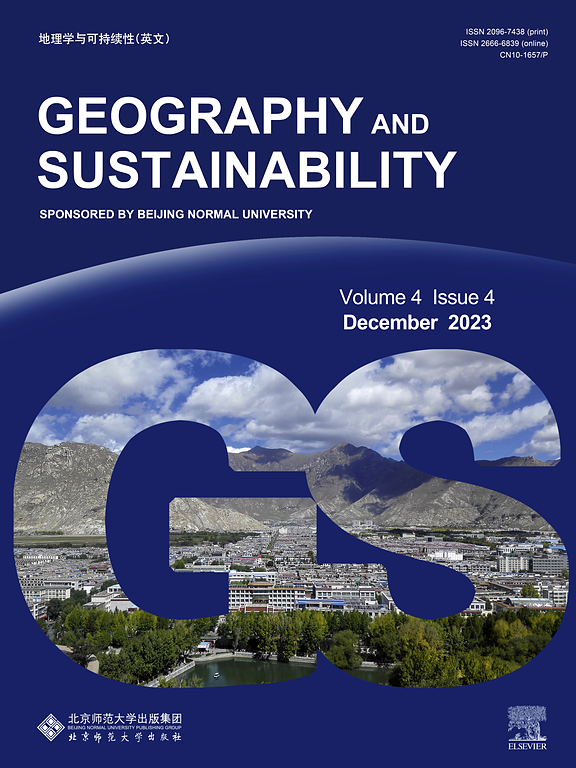尼泊尔提供生态系统及其服务的治理:来自政策、立法和制度评估的经验教训
IF 8
1区 环境科学与生态学
Q1 GEOGRAPHY, PHYSICAL
引用次数: 0
摘要
生态系统退化和生态系统服务丧失有多种原因,需要协调和多样化的政策、立法和机构对策来有效解决这些问题。了解管理生态系统服务的政策、立法和制度可以加强生态系统服务的持续管理和提供。因此,本工作对尼泊尔政府制定的政策、立法和制度规定进行了评估。此外,本研究还分析了政策影响,并确定了阻碍未来改善生态系统服务管理的差距和障碍。总共评估了尼泊尔政府颁布的63份文件,包括45项政策和18项立法,以进行内容分析。还进行了20次关键信息提供者访谈,以获得关于政策制定和执行方面差距的专家见解。研究结果表明,虽然一些部门政策和立法对生态系统及其服务的管理作出了明示或隐含的规定,但仍缺乏处理生态系统服务的总体框架。宪法、政策和立法规定的角色和责任重叠,加上执行不力和缺乏多部门协调机制,是有效执行政策的重大障碍。因此,有必要制定一个以立法为后盾的总体国家框架,并建立一个强有力的多部门协调机制,对生态系统及其服务的持续管理和提供采取全面和多学科的办法。本文章由计算机程序翻译,如有差异,请以英文原文为准。

Governance on provision of ecosystem and its services in Nepal: Lessons from appraisal of policy, legislation, and institution
Ecosystem degradation and the loss of ecosystem services stem from multiple causes, requiring coordinated and diverse policies, legislation, and institutional responses to effectively address them. An understanding of the policies, legislation, and institutions governing ecosystem services can enhance the sustained management and provision of ecosystem services. Therefore, this work appraises the policies, legislation and institutional provisions made by the government of Nepal. In addition, this study analyzes policy implications and identifies gaps and barriers that hinder future improvements in the management of ecosystem services. Altogether, 63 documents comprising 45 policies and 18 legislations promulgated by the government of Nepal have been assessed for content analysis. Twenty Key Informant Interviews (KIIs) have also been conducted to obtain expert insights about the gaps in policy formulation and implementation. The results indicate that though several sectoral policies and legislations have made provision on management of ecosystem and its services implicitly or explicitly, still there is lacking of overarching framework to deal with ecosystem services. Overlapping roles and responsibilities outlined in the constitution, policies, and legislation, coupled with weak enforcement and lack of multisectoral coordination mechanism, are significant obstacles to effective policy implementation. Therefore, there is a need to develop an overarching national framework backed up by legislation with a strong multisectoral coordination mechanism that will adopt a holistic and multidisciplinary approach to the sustained management and provision of the ecosystem and its services.
求助全文
通过发布文献求助,成功后即可免费获取论文全文。
去求助
来源期刊

Geography and Sustainability
Social Sciences-Geography, Planning and Development
CiteScore
16.70
自引率
3.10%
发文量
32
审稿时长
41 days
期刊介绍:
Geography and Sustainability serves as a central hub for interdisciplinary research and education aimed at promoting sustainable development from an integrated geography perspective. By bridging natural and human sciences, the journal fosters broader analysis and innovative thinking on global and regional sustainability issues.
Geography and Sustainability welcomes original, high-quality research articles, review articles, short communications, technical comments, perspective articles and editorials on the following themes:
Geographical Processes: Interactions with and between water, soil, atmosphere and the biosphere and their spatio-temporal variations;
Human-Environmental Systems: Interactions between humans and the environment, resilience of socio-ecological systems and vulnerability;
Ecosystem Services and Human Wellbeing: Ecosystem structure, processes, services and their linkages with human wellbeing;
Sustainable Development: Theory, practice and critical challenges in sustainable development.
 求助内容:
求助内容: 应助结果提醒方式:
应助结果提醒方式:


